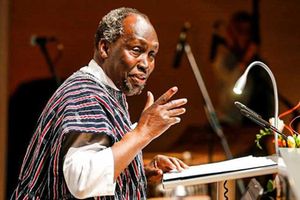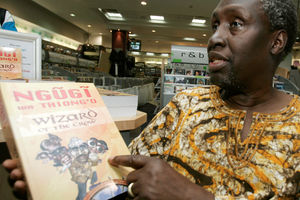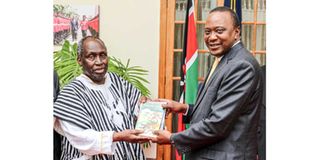
President Uhuru Kenyatta with Prof Ngugi Wa Thiong’o when he called on him at State House, Nairobi.
The call from State House came at around 11 am on Thursday, June 4, 2015. “I'm I talking to Kiarie Kamau?” the caller, a senior State House official, enquired.
“Yes, you are,” I responded. “ There is this letter you wrote about a courtesy call by Ngugi wa Thiong’o to State House, but unfortunately, you did not make a follow-up.”
My first reaction was to shoot back and explain how we had encountered a frustrating 90 days trying to get a response from the hallowed House, but I opted to maintain my cool.
The official then informed me that President Uhuru Kenyatta was ready to meet Ngugi at State House the following week, on Monday, June 8.
He assured me that a formal letter to that effect would be delivered to my office. Hardly had I replaced the receiver when my personal assistant abruptly came to my office and informed me that there were some people who wanted to see me.
I immediately guessed who they were and advised her to let them in. She was, however, a bit hesitant. “Mmmm … and they look like police officers,” she advised, or rather warned me, wearing a worried look. I reassured her, and she let them in.
They were a friendly lot, sent to deliver a letter from State House, signed by the Chief of Staff and Head of Public Service, Joseph Kinyua.
I later learnt that the four had used a police vehicle with a siren to clear the way for them to deliver the letter to my office in Westlands as fast as possible.
I got to learn that they had caused a stir at the parking lot and at the entrance to the building, as they bulldozed their way to my office.
Also Read: Ngugi wa Thiong’o: Life and Times
The letter had advised me that the courtesy call had been scheduled for 11 am atthe State House.
It is important to give context to this letter from State House. We at East African Educational Publishers had spent an agonising 90 days trying to get a response to a letter we had written to State House.
We had planned elaborate celebrations of the 50th Anniversary of Ngugi’s Weep Not, Child, and Ngugi was to spend a couple of days in the country for the celebration.
He had, however, made a special request – he was desirous of meeting both Uhuru Kenyatta and former Prime Minister Raila Odinga.
He indicated that he had a special message for the duo and hence asked me to book separate appointments with both.
Three months before his arrival, I consulted protocol officers from both offices and proceeded to send the letters, requesting a courtesy call by Ngugi. Raila’s office in Capitol Hill responded almost immediately; but State House did not. Frequent follow-ups with a dozen senior people bore no fruit.
In the midst of the frustration, we went ahead with Ngugi’s itinerary. In line with basic protocol, the visit to State House was supposed to happen before the one to Capitol Hill, but since State House had not responded in spite of constant reminders, the date we had set passed.
As such, we proceeded to visit Capitol Hill. It was clear that adequate preparations had been made to receive Ngugi at Capitol Hill, given the number of Raila’s key lieutenants present.
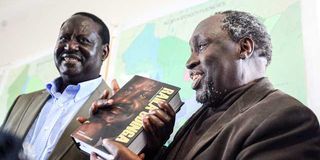
ODM chief Raila Odinga (left) hands his biography to writer Ngugi wa Thiong’o at his offices in Nairobi on June 2, 2015.
There was notable camaraderie between Ngugi and Raila, which culminated in private discussions by both. Apart from presenting Raila with autographed copies of Weep Not, Child, Ngugi also had another special gift for Raila – a 1964 black-and-white photograph. We shall come to that later.
The following day, the visit was generously splashed in all the dailies. One of them had a screaming headline: ‘Not Yet Uhuru, Raila Tells Ngugi’.
That must have been the one that woke up the State House bureaucrats. They suddenly ‘remembered’ the letter I had written, hence the telephone call and prompt setting up of an appointment.
President Kenyatta was elated as he received Ngugi. After the pleasantries, Ngugi delivered a powerful speech, after which he presented Uhuru with autographed copies of his books.
He also had a special gift, the 1964 black-and-white photograph of President Jomo Kenyatta, Vice-President Jaramogi Oginga Odinga, ‘Nation’ journalist James Ngugi (Ngugi wa Thiong’o), among others.
Venue? Jomo’s Ichaweri home in Gatundu, where a delegation of farmers from Murang’a had visited to deliver donations they had collected to help flood victims of Nyando Plains.
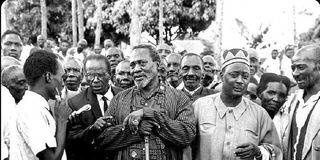
Daily Nation journalist James Ngugi (Ngugi wa Thiong’o) with President Jomo Kenyatta and Vice President Jaramogi Odinga at Ichaweri in Gatundu in 1964.
According to Ngugi, some of the donations were in the form of goats and chickens. Both Jomo and Jaramogi were happy to receive them. It is the same photograph that Ngugi had presented to Raila.
People-to-people power
He used the photograph to deliver this message to Uhuru:
“The photo has long lived in my memory because it was an image of what our Kenya could have become: a society where, even a morsel, could be shared among the needy. Or as the patriots of the Kenya Land and Freedom Army (Mau Mau), used to sing, when a bean fell to the ground it was shared among us.”
Having said that, Ngugi informed Uhuru that he considered the photo as a “great image of a people-to-people power”.
It is instructive to note that this was in 2015, a period of high-octane political tensions. The 2013 General Elections had left the country in a fractured state.
During personal conversations, it was clear that Ngugi was deeply concerned about the political posturing and bickering, and wished that the leaders of the political divide could reach an amicable resolution of the issues at stake, for the sake of Wanjiku, the ordinary mwananchi.

President Uhuru Kenyatta with Prof Ngugi Wa Thiong’o when he called on him at State House, Nairobi.
That is why he had yet another message for Uhuru:
“… if we are going to move our society forward, we need a vision to guide us. And this vision must continue to embrace difference. A person who agrees with you does not add much to you: he simply affirms what you have already arrived at. But a person who disagrees may make one rethink one’s position, or correct shortcomings or reaffirm it. Difference is the great engine of progress.”
Uhuru took Ngugi’s message positively, and it was clear that he was genuinely happy to meet him. He instructed me to take Ngugi back to State House in a few days’ time, since he wished to have a private conversation with him. He also instructed the then State House Spokesman, Manoah Esipisu, to set the date.
This second visit was promptly set up, and I again accompanied Ngugi to State House. Both Uhuru and Ngugi went for their private conversation for about two hours.
However, Ngugi never revealed details of their discussions, but quipped: “Jomo Kenyatta sent me to State prison. Daniel Arap Moi chased me out of State. Uhuru Kenyatta received me in State House.”
Private discussions
Could these private discussions between Ngugi and the then political protagonists, Uhuru and Raila, complete with the symbolism of that 1964 photograph, have been a harbinger for the 2018 Handshake? Well, no one can tell.
From then onwards, both Uhuru and Ngugi continued to communicate, and I was given a specific liaison person at State House, who would be in charge of the Uhuru-Ngugi interactions and discussions.
When Uhuru was asked to preside over the opening of the refurbished Kenya National Theatre on September 4, 2015, he insisted that he would only do so in the presence of Ngugi.
I was asked to communicate the same to Ngugi, and the State organised an all-expenses-paid visit for this purpose. Ngugi was amused to be welcomed at the airport by State officials and security men, with two chase cars, complete with a siren, sandwiching the official vehicle allocated to him. Known for his witty quips, Ngugi told me: “In 1977, I was escorted to Kamiti Maximum Security Prison by a siren; today, I am being escorted to State House by a different siren.”
Sadly, Ngugi’s death came at a time when the political temperatures are again at an all-time high.
Mr Kamau is the CEO, East African Educational Publishers and chairman of Kenya Publishers Association

